Movie Review – Hulk
Lethargic, almost insanely slow opening half is mitigated by a power-packed finale (heh), although by that point you’re probably too far into “don’t care” to care. Bana is underwritten, Connelly couldn’t care less, and Nick Nolte looks like he’s wandered into a different movie – Ang Lee desperately tries to keep this on track, but a hokey script and an overabundance of underdeveloped ideas leave Hulk a less-than satisfactory film experience.
– Summary –
Director : Ang Lee
Year Of Release : 2003
Principal Cast : Eric Bana, Jennifer Connelly, Josh Lucas, Sam Elliot, Nick Nolte, Paul Kersey, Cara Buono, Celia Weston.
Approx Running Time : 138 Minutes
Synopsis: Doctor Bruce Banner, after being irradiated by Gamma radiation when an experiment goes horribly wrong, discovers that he changes into an enormous green monster when he gets angry. Naturally, the Government wants to study him, and everyone else wants to run away from him.
What we think : Lethargic, almost insanely slow opening half is mitigated by a power-packed finale (heh), although by that point you’re probably too far into “don’t care” to care. Bana is underwritten, Connelly couldn’t care less, and Nick Nolte looks like he’s wandered into a different movie – Ang Lee desperately tries to keep this on track, but a hokey script and an overabundance of underdeveloped ideas leave Hulk a less-than satisfactory film experience.
**********************
Back in 2003, Ang Lee was one of the hottest directors around. Coming off the Oscar success of his 2001 Chinese-language blockbuster, Crouching Tiger, Hidden Dragon, Lee could pretty much choose whatever project he wanted; after years of low-key dramatic movies, including Sense & Sensibility (1995) and The Ice Storm (1997), his acceptance into the mainstream came with the tugging of his attention from studios wanting him to helm major tent-pole releases. After all, he’d proven himself capable of delivering major action set-pieces with Crouching Tiger, alongside a more character-driven focus – a delicate balance to say the least, but one which the accomplished director had spent a decade or so honing to perfection. The focus of character over action was a salacious prospect for Marvel’s burgeoning cinematic franchises, and when Universal teamed up with Marvel to produce the first big-screen attempt at the Hulk, one felt the project was in safe hands. After all, a director of similar talent had performed a minor miracle with the X-Men franchise over at Fox, and a former horror-director had launched Spider-Man for Sony to one of the biggest opening weekends of all time – Lee’s time to shine was here. The question was: would Lee be able to deliver a full-blown action film in the vein fans wanted, or not?
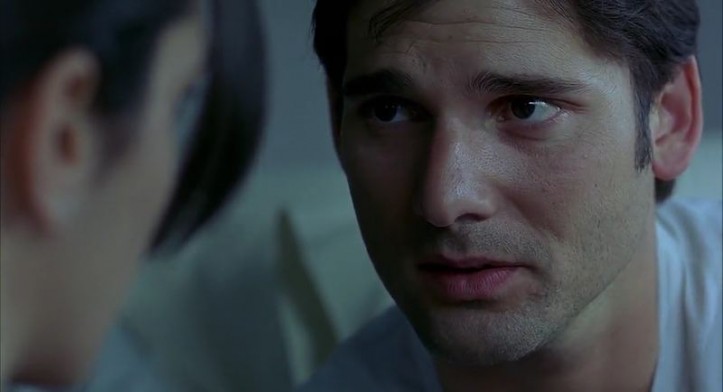
Bruce Krenzler (Eric Bana) and Betty Ross (Jennifer Connelly) work together at a scientific laboratory trying to solve the key to cell regeneration. As the film opens, they’ve just ended a relationship, although with a major sponsorship deal coming along, they decide to work together for the common good. However, things turn sour when Bruce saves a fellow lab assistant and inadvertently becomes irradiated by Gamma radiation – radiation which Bruce and Betty have been using to test animal reactions to their experiments. Although the blast should have killed him, Bruce survives against the odds, although a new janitor at the lab (Nick Nolte) informs him that he’s actually had an experiment on him while a child – his father, David Banner, used him as a guinea pig back in the 60’s, when his own lab funding was cut off. Bruce becomes violently angry, and metamorphoses into a giant, green hulking figure, with enormous strength, regenerative ability and rage. As this uncontrollable monster, Bruce causes immense damage, although it does lead him into direct conflict with the military – led by Betty’s father, General Ross (Sam Elliot), and aided by government contractor Talbot (Josh Lucas), who see the potential to turn this ability into some kind of weapon. Cornered, with seemingly no help and no escape from persecution, Bruce discovers his true identity, and uncovers a secret that will, or rather has, changed his life forever.
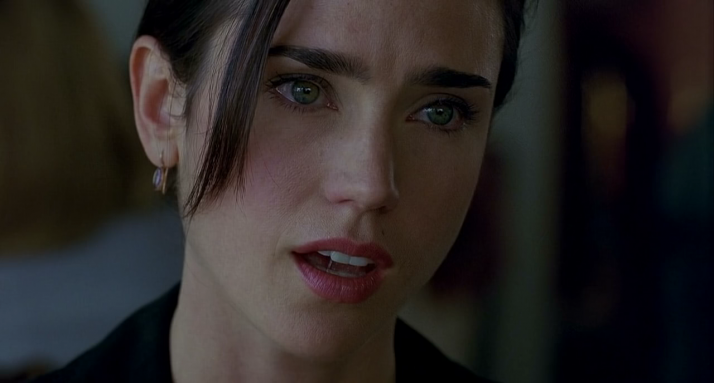
I’m not quite sure how a concept as awesome as the Hulk managed to become such a debacle of a film. While a lot of folks have lumped the lack of acclaim for this film squarely on Ang Lee, I’m inclined to place blame elsewhere – specifically, the screenplay. Written by James Schamus, Michael France and John Turman (although many other hands touched it before it fell through to Ang Lee), the film lacks focus in a couple of areas it desperately needed to: the relationship between Betty and Bruce, or lack thereof, and the prickly relationship between Betty and her father. Instead, the script tries to engender feelings of abandonment by having Bruce’s real father end up being the cause of his “hulkification”, and be as paranoid and obsessed with his own research as Bruce is with his. It’s a script bereft of emotion (except for the anger, of which there is plenty, even if it stems from nothing except a bit of argy-bargy with the Bad Guys), and it does tend to become somewhat one-note after a while. The first half of the film, which spends an inordinate amount of time setting up Bruce’s accident and getting all its ducks in a row, lacks cohesive emotional bonding with the audience, an alienating experience that turns one off instead of capturing your imagination.
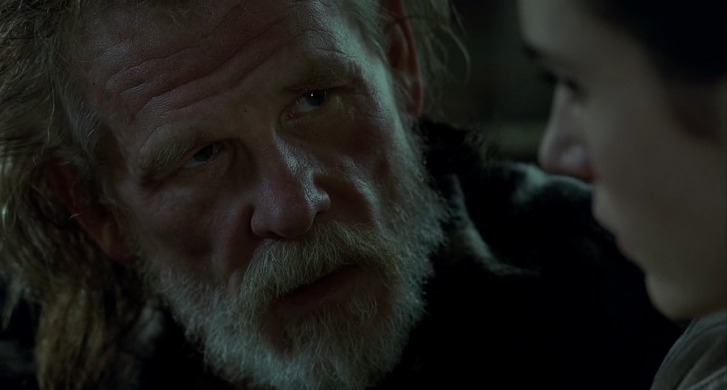
Indeed, there’s so much stuff here that’s introduced but never explained, I was starting to get annoyed. Case in point: Bruce and Betty have just ended a relationship as the film opens, and yet once this fact is brought to our attention, it’s subsequently buried for the rest of the film and becomes an inconsequential plotline – why bring this up if you’re not going to explore it? Instead of giving time to the main players, the script decides to focus a great deal on Nolte’s obsessive father-figure, who haunts Bruce’s past with nightmares and dreams (which, in turn, provokes the anger inside him), as well as General Ross’s seemingly unswerving dedication to locking Bruce up forever without provocation and throwing away the key. Following orders is one thing, but the lack of prejudice Ross shows is never explained, and thus comes across as somewhat arch and petty, undermining the character’s authority.
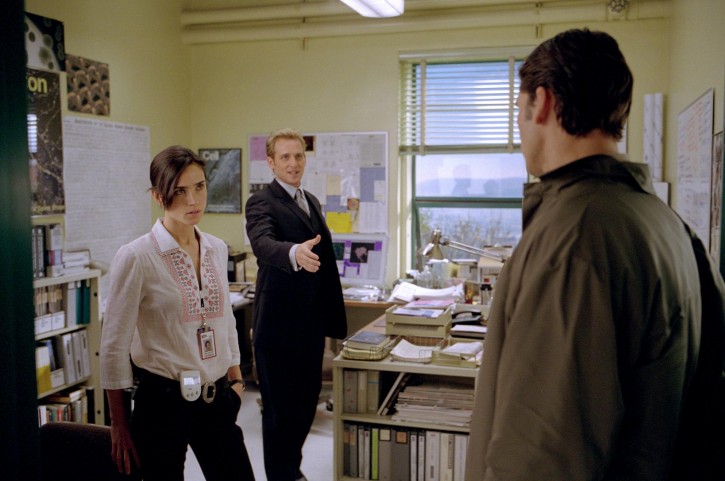
As mentioned, the opening act of the film is laboriously slow, to the point of tedium, with entire minutes of exploding frogs, rock moss and dead tree-stumps seemingly the motif we’re meant to follow as Bruce and Co experiment on animals. Although the point of this is somehow linked to Bruce’s Hulk experience, the link is tenuous indeed – audiences want the Hulk to smash stuff, get angry and cause damage (don’t worry, he does in the end) but it seems like the filmmakers wanted us to get some kind of “don’t screw with nature” moral message before the Hulk comes to play. We get it – just get on with it! The script founders in the opening acts as both Eric Bana and Jennifer Connelly can’t seem to get a handle on the core truth to their characters; their dialogue clunks to the floor like lead as they are forced to endure scene after scene of exposition and coercive plot contrivance. Lee can’t bring any urgency or energy to the opening half of the movie (at least, not to anything without the Hulk in it) no matter how he tries.
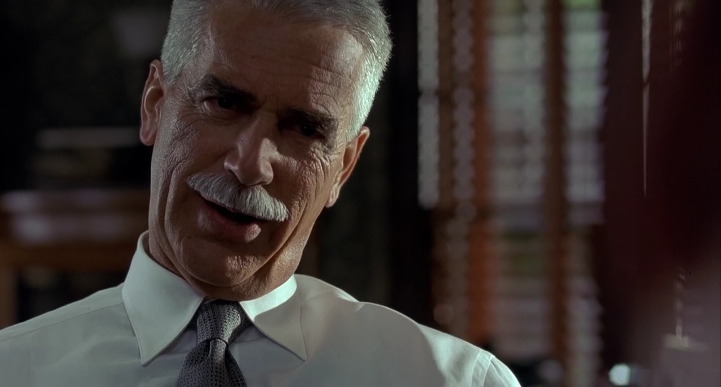
And he does try. Editorially, Hulk has one of the better looking editing works I’ve seen in modern cinema. Using fading, split screens and cross-cutting within a frame, Lee tries to make his film a real comic book brought to life, as if he’s showing us pages of action and reaction in live-action. To a point, it’s effective, although I will admit by the end it was starting to get tiresome with the “look at how clever we are” scene changes and fades. While the opening act of Hulk draaaaags like sack full of sloths, the latter half is more action-packed, and Lee manages to deliver a film experience which is at least somewhat exciting – although by this point, most people have given up and gone home. As the Hulk invariably battles more and more military appliances (from helicopter gunships to armored tanks to full fighter jets), the explosions and stunt sequences raise the bar from what’s come before. The CGI Hulk, based loosely on Eric Bana’s physique and look, shifts from morning-cartoon style in the first few scenes he appears, moving to “damn that’s awesome” midway through the film (especially when the Hulk fights three enormous Hulk-dogs) to simply sublime (the fight to San Francisco and all that comes after), although why Lee chose to shoot a lot of it at night, in near pitch darkness, staggers me a little. We want to see the Hulk in the daylight, laying the smackdown on all who come his way – instead, a lot of the Hulks scenes are set in darkness; especially the crucial finale, which seems to have been staged by moonlight, making it less than evocative as it should be.
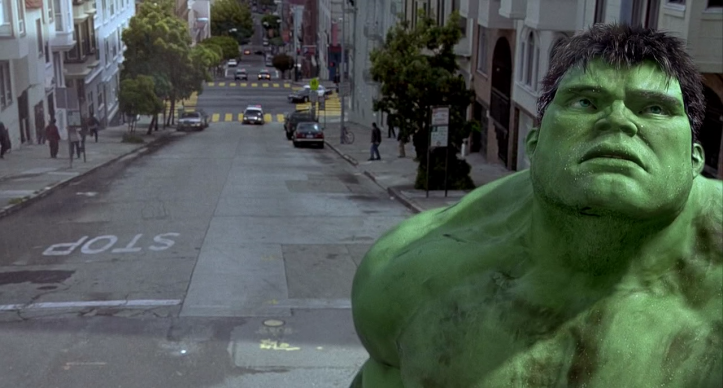
One couldn’t fault the actors for the poor performance of this film; for the most part, they all try hard. Eric Bana, as Banner, never really gets the chance to do more because his character is so poorly written, while Jennifer Connelly looks like she couldn’t be bothered even finding some kind of character to play as Betty. Nick Nolte, who sounds like his voice is still being carved from a chunk of granite in the Grand Canyon, once more does his best impression of a crazy-eyed hobo, and he brings a sense of the wacky to a film which sorely needs it. Sam Elliot has the required gravitas to play General Ross, while Josh Lucas must have loved sinking his teeth into the role of a slimy, money-grubbing douche who gets more than the crap kicked out of him by the Hulk. They might not know what they’re all doing, but at least they’re trying to make this a good movie. However, when the dialogue is this bad and the pacing is this glacial, it gets hard to take.
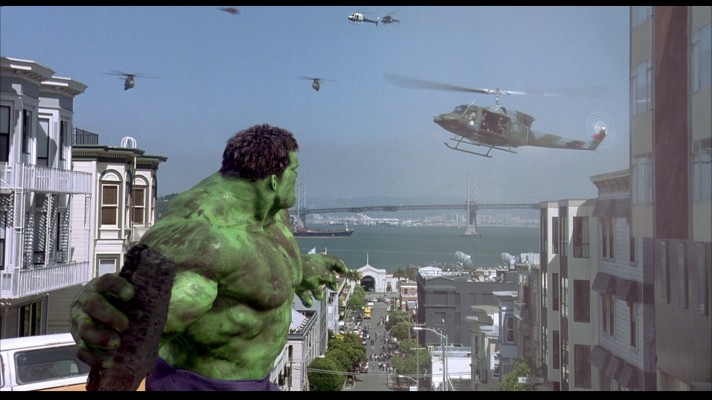
Hulk is a film of missed opportunity. With such a dreary, dullard screenplay and a lack of focus (and development beyond cartoon cliches) on the main players, Lee was always up against it trying to deliver a film that satisfied both the studio and the fanboys. My advice? When in doubt, try and please the fanboys, after all, they’re the ones buying the tickets. While Hulk remains a confused, confusing entry into Marvel’s canon of films, the end result isn’t as bad as many people make out; having said that, there’s too many problems to ignore as simply not understanding the concept. Hulk is tedious at times, fun at others, and could have lost about 45 minutes of fat from its running time and become a really tight, terrific film. Instead, apparently the screenwriters decided we needed to be force-fed some hokey emotive content in the hope that we’d see it as simply another “comic book movie”. They should have given their audience more credit, and spent more time giving Bruce and Betty some actual depth to their characters. Which would have helped when the Hulk showed up and all hell broke loose.


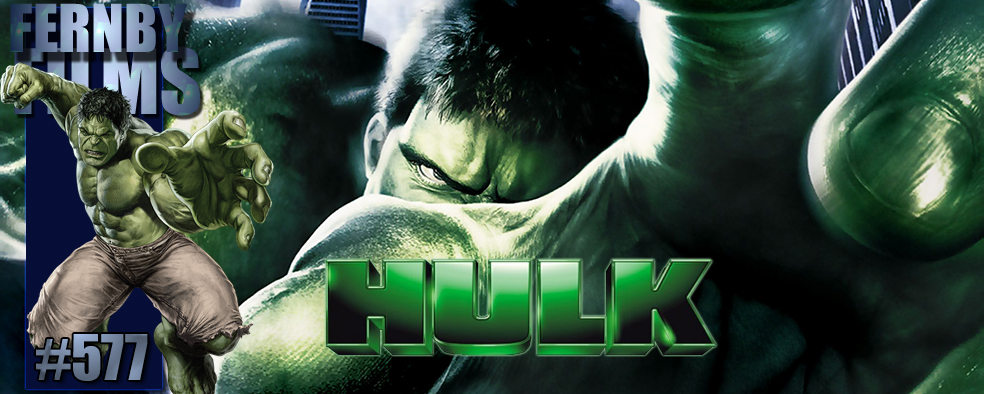



 Making sense of Marvel
Making sense of Marvel

It's such a good looking film and its occupied by so many good actors that it's just kind of disappointing it doesn't mesh together at the end.
Agreed Colin: this is a terrific LOOKING film, it's just a pity the story and characters didn't coalesce into something more….. gooderer. 😀
Good review Rod. It isn't a terrible watch, it's just nothing that's as fun or as entertaining as you'd suspect it to be with the Hulk in the lead character. The cast is fine, but they aren't given that much weighty material to work with, despite Ang Lee trying his hardest to make it more than just a brainless exercise in fun and superheroes.
My recent post Girl, Interrupted (1999)
Good point: Ang Lee tried. Though I don't think even Michael Bay or Spielberg could have made this film any more watchable – the scripting was terrible….